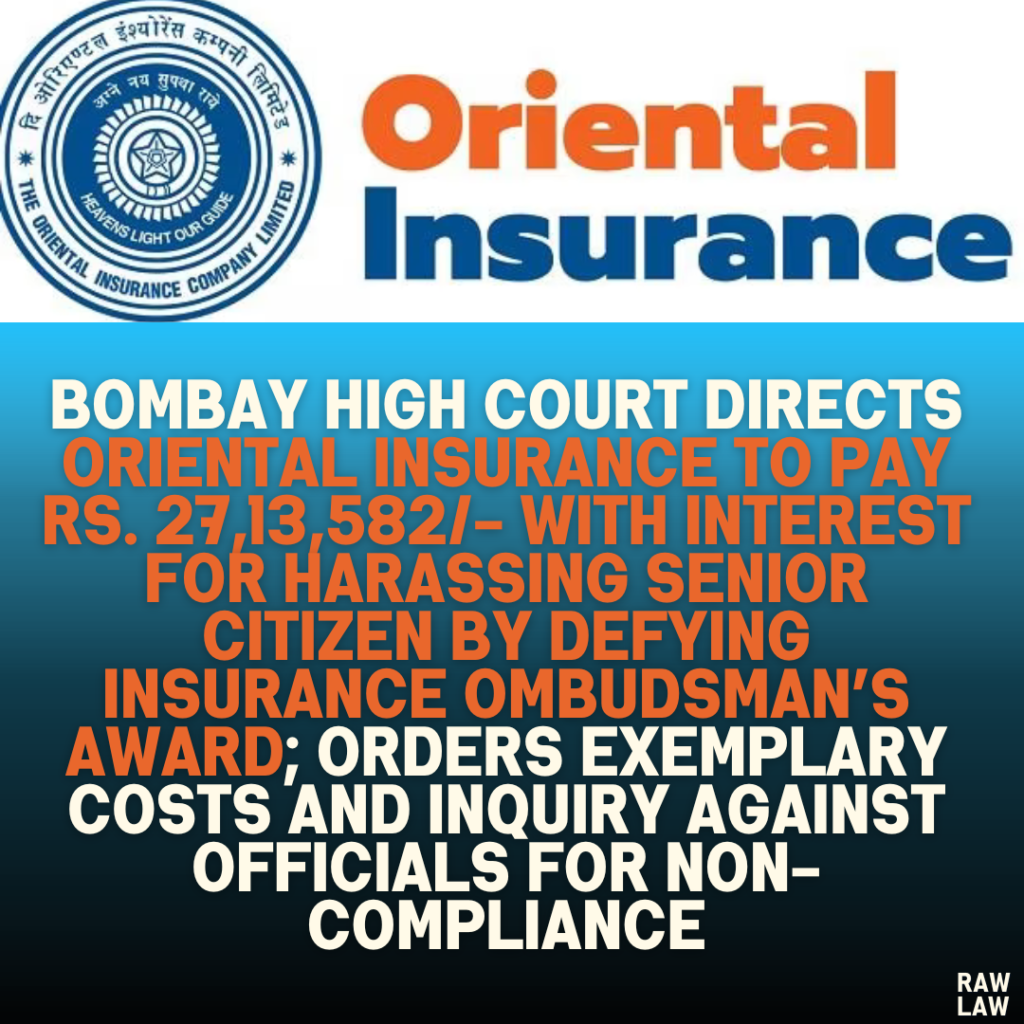Court’s Decision
The Bombay High Court dismissed the Oriental Insurance Company’s Writ Petition No. 706 of 2024, which challenged the Insurance Ombudsman’s award dated May 3, 2021. It upheld the award and directed the company to:
- Pay the awarded amount of Rs. 27,13,582/- with 7% interest from July 1, 2021.
- Pay exemplary costs of Rs. 1,00,000/- within four weeks.
- Conduct an inquiry to identify the officials responsible for delaying compliance with the award and recover the costs and interest from their salaries.
The Court allowed the claimant’s Writ Petition No. 2903 of 2021 seeking enforcement of the Ombudsman’s award and decried the insurer’s conduct, terming it as grossly negligent and harassing.
Facts
- The claimant, a senior citizen, underwent medical treatment for coronary artery disease, incurring significant costs amounting to Rs. 27,13,582/-. He sought reimbursement under multiple health insurance policies issued by the Oriental Insurance Company.
- The insurer only offered Rs. 5,81,466/- towards the claim, citing policy limits and alleged violations of policy terms.
- Dissatisfied, the claimant approached the Insurance Ombudsman, who awarded Rs. 27,13,582/-. The insurer failed to comply with the award within the stipulated 30 days and instead filed a writ petition challenging it.
- Simultaneously, the claimant filed Writ Petition No. 2903 of 2021 to enforce the Ombudsman’s award.
Issues
- Jurisdiction of the Ombudsman: Did the Insurance Ombudsman exceed its jurisdiction in awarding the claim?
- Validity of Policy Terms: Was the insurer justified in partially repudiating the claim based on policy limits and alleged misrepresentations by the claimant?
- Delay and Harassment: Did the insurer’s actions amount to a deliberate delay and harassment of the claimant?
Petitioner’s Arguments
- Jurisdictional Overreach: The insurer argued that the Ombudsman exceeded its powers under Clause 13 of the IRDA Notification, 2017, as there was no total repudiation of the claim.
- Policy Violations: It claimed that the claimant had failed to disclose pre-existing conditions (diabetes and ischemic heart disease) in the proposal form, rendering the policies void.
- Excessive Award: The insurer contended that the award amount exceeded the policy limits of Rs. 25,00,000/- and was based on unreasonable and non-customary charges.
- Public Monies: It argued that paying beyond the policy limits would waste public funds and sought the court’s intervention to nullify the award.
Respondent’s Arguments
- Good Faith: The claimant argued that the insurer accepted premiums and issued policies despite being aware of his medical history, as disclosed in the proposal form.
- Jurisdiction Validity: He contended that his complaint pertained to partial repudiation of claims, which was well within the Ombudsman’s jurisdiction under Clause 13.
- Suppression and Harassment: The insurer’s failure to comply with the award, suppression of material documents, and filing of a defective writ petition caused unnecessary harassment, especially given the claimant’s age.
- Costs and Interest: The claimant sought exemplary costs and interest for the undue delay caused by the insurer’s conduct.
Analysis of the Law
- Jurisdiction of the Ombudsman:
- Clause 13 of the IRDA Notification, 2017, empowers the Ombudsman to handle disputes, including partial repudiation of claims. The Court held that the claimant’s case of receiving only Rs. 5,81,466/- against a claim of Rs. 27,13,582/- constituted partial repudiation.
- Clause 13(1)(i) allows the Ombudsman to address disputes arising from violations of policy terms, including short payments, thereby validating its jurisdiction.
- Policy Terms and Disclosure:
- The insurer’s argument about non-disclosure of pre-existing conditions was dismissed as the proposal form was unsigned and not raised before the Ombudsman. Further, the insurer had accepted the proposal, issued policies, and collected premiums.
- Reasonable and Customary Charges:
- The insurer failed to provide evidence that the claimant’s medical charges were unreasonable. The Court noted that medical expenses could vary depending on the patient’s condition, and mere comparative data from other patients was insufficient to challenge the charges.
Precedent Analysis
The Court cited Lucknow Development Authority v. M.K. Gupta (1994) 1 SCC 243, emphasizing:
- Public authorities are liable to compensate citizens for arbitrary or oppressive actions.
- Public officials responsible for delays and harassment should personally bear the costs, preventing misuse of public funds.
Court’s Reasoning
- Gross Misconduct by the Insurer:
- The insurer suppressed material documents, delayed clearing objections in its petition, and failed to seek interim relief while defying the Ombudsman’s binding award.
- Its arguments about protecting public monies were deemed insincere and hypocritical, as the same funds were wasted on litigation and delays.
- Binding Nature of Ombudsman’s Award:
- Under Clause 17 of the IRDA Notification, 2017, insurers must comply with Ombudsman awards within 30 days. The insurer breached this mandate without justification.
- Equitable Relief Denied:
- The Court denied any relief to the insurer under Article 226 of the Constitution, citing its gross misconduct and frivolous challenges.
Conclusion
- The Court dismissed Writ Petition No. 706 of 2024 with exemplary costs of Rs. 1,00,000/- and directed the insurer to pay the awarded amount with 7% interest from July 1, 2021.
- It ordered an inquiry to fix responsibility on officials for the delay and recover the costs and interest from their salaries.
Implications
- Accountability for Public Officials: The judgment sends a strong message to public-sector insurers to avoid delays, suppressions, and frivolous litigation in handling claims.
- Policyholder Rights: It reinforces the binding nature of Insurance Ombudsman awards, ensuring prompt compliance to protect policyholders.
- Regulatory Oversight: The Court directed the IRDA to monitor compliance with Ombudsman awards and strengthen mechanisms to prevent similar instances of harassment.
